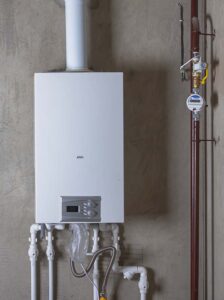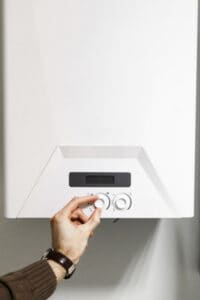You might not be aware of the differences between a boiler system and a hot water heater. Both boilers and water heaters are used to supply hot water to a home or building, but the hot water is for different purposes.
Understanding the difference between these two popular options is important for all homeowners to know if they’re looking to get the most out of their heating system.
What is a Water Heater?

Just as the name suggests, a hot water heater is used to heat water. Hot water heaters heat potable water, which means you can use this hot water to shower, wash, cook, and clean.
A traditional tank model water heater will store the heated water in a large tank, and pump it throughout the home when you open a tap or start an appliance that uses water.
Tankless water heaters don’t store the heated water, but instead rapidly heat cold water on-demand.
What is a Boiler?

Boilers heat water, but not for you to use in bathing and cooking. Instead, it heats water (some models turn it into steam), distributing it around the house in order to heat it up. This is what’s known as a radiant heat system.
Just as with a hot water heater, a boiler will take cold water, heat it up, then use a pump to push the hot water or steam throughout a network of pipes to radiators located throughout the home. This home heating system produces quiet, even heat, and might be a good option if you suffer from allergies or dry air—furnaces heat and blow air, which can dry out your home’s indoor air and distribute allergens.
How Does a Combi-Boiler Work?
A combination boiler (or combi-boiler) is a furnace and a tankless hot water heater all in one unit. It eliminates the need for a water storage tank, and can offer more than 90% efficiency (with some reaching as high as 95-98%).
A combi-boiler uses steam, hot water, or baseboard radiators to distribute heat throughout your home. And when you turn on a tap, the same water that’s already heated is available to use for washing or cooking. The combination boiler’s built-in heat exchanger automatically burns natural gas and transfers the resulting heat to the cold water. Once that cold water is heated up to the correct temperature, it’s transferred to the hot water tap you’ve turned on.
While it is more expensive than a tankless water heater, it might be a good option to look into if you’re undergoing renovations, since you won’t need to change an entire furnace or HVAC system out.
What’s the Difference?
Essentially, a boiler system is used to provide heat to your home using radiant heat. A hot water heater will provide domestic hot water (water that you can use to drink, bathe, or wash with).
Efficiency
There are several fuel sources for boilers, such as natural gas, propane, or heating oil. Hot water heaters can rely on electricity, natural gas, propane, or even solar power.
It’s hard to directly compare the two heating systems, especially since each will have many models and types that vary in their efficiency.
With either a boiler and a water heater, you’ll need another system that offers what the other doesn’t. Unless, of course, you go with a combi-boiler, which can heat your home and provide hot water in a single unit.
Maintenance
Both a boiler and a water heater will require maintenance to keep it in good working condition.
For boilers, you’ll have to inspect it annually, regularly clean any vents and flues, descale lime buildup, fully flush and clean the system, and lubricate any moving parts about every 6 months.
For water heaters, you’ll need to regularly inspect it for any leaks or other issues, test the water valve (with the power off) to make sure it stops the flow correctly, and drain the tank to get rid of any sediment inside.
Life Expectancy
Both boilers and water heaters offer similar life spans of about 10 to 15 years.
As with any appliance, opting for a higher quality model, and keeping it properly maintained, will extend the life expectancy of your unit.
If life expectancy is your top concern, it’s worth looking into a tankless water heater, since those can last up to 20 years if properly maintained.
Cost
Generally, a boiler installation is a more significant investment than a water heater installation. When you add up the cost of the unit itself and the labour it takes to install, a boiler can set you back somewhere between $3,500 to $8,000.
For water heaters, the total cost of purchase and installation might be somewhere between $1,000 to $3,500. Tankless water heaters vs tank heaters can cost more than this, so be sure to do your research before deciding and comparing between a boiler and a water heater.
Trust The Experts at Knight to Guide You in the Right Direction
Whether you’re looking for professional advice, or have already decided on a boiler or a water heater, we can help. We’ll give you a quote on our installation services, and help you choose the make and model that suits your home and budget.






